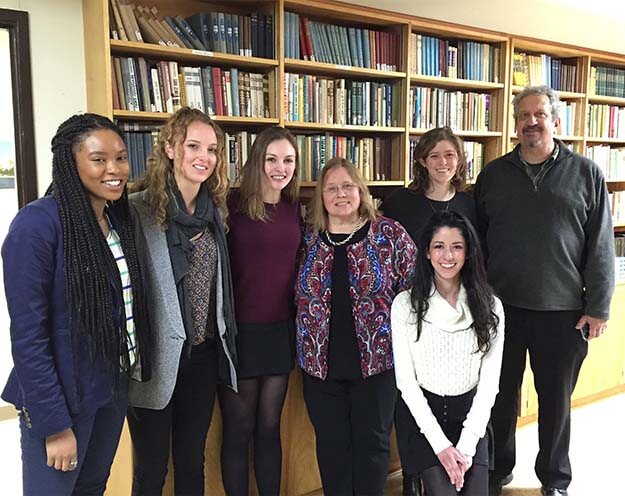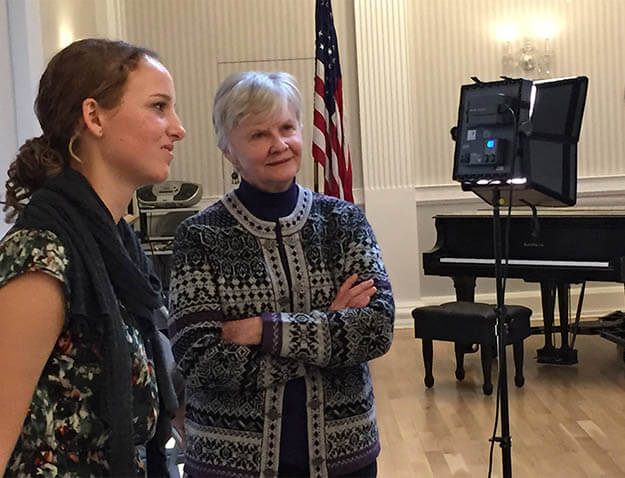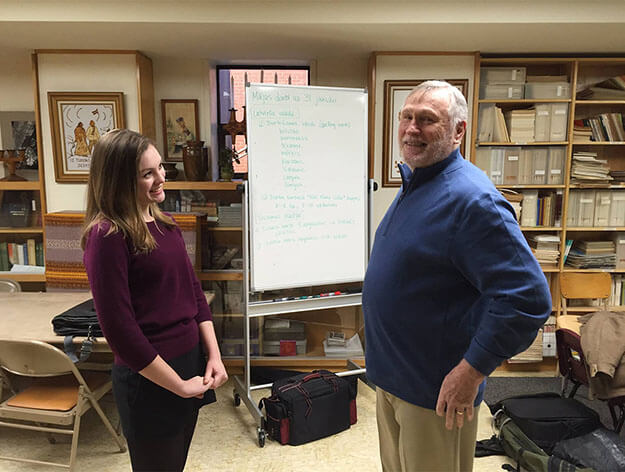 Janae Barrett, Hannah Weinstein, Grace Sullivan, interviewee Kaja Weeks, Emma McAvoy, Alex Mendez, interviewee Karl Altau. Photos from Kogu Me Lugu facebook page
Janae Barrett, Hannah Weinstein, Grace Sullivan, interviewee Kaja Weeks, Emma McAvoy, Alex Mendez, interviewee Karl Altau. Photos from Kogu Me Lugu facebook page
SA UNITAS PRESS RELEASE
February 4, 2016
As part of a college study course launched this year in January, American students interview members of the Estonian diaspora in the USA and create short films based on their stories.
“We’ve been able to put 7 more people into the world who know something about Estonian history,” said James Tusty, film maker and co-instructor of the course.
In January 2016, the Unitas Foundation, an Estonia-based non-profit organization dedicated to history and human rights education, and Williams College in Williamstown, MA, launched the course Documenting Stories of Escape and Survival, a one-month study programme focusing on recording and sharing the stories of Estonian WWII refugees and their descendants.
Several students who signed up were motivated by the chance to learn more about Estonia’s history and the Estonians’ personal experiences of WWII. “I want to learn not only about the history of Estonia during World War II, but I also want to further my research on war victims and how they consolidate and remember turmoil,“ said Janae Barrett, a double major in political science and history.
The chance to learn and practice film making under professional guidance was also considered motivating. “This is an exceptional opportunity to explore the process of capturing history with professionals in the field,“ said Grace Sullivan, a Williams student contemplating a career in documentary film. The course was offered for 7 students.
 Hannah Weinstein and Mari Teedla
Hannah Weinstein and Mari Teedla
Through documentary films and readings, the students spent the first week of the course learning about the history of Estonia’s fight for self-determination, and the non-violent “Singing Revolution” that brought Estonians their freedom and contributed to the collapse of the Soviet Union in 1989. In the second week, along with training in film editing, the students explored the goals of oral history and the process of creating narrative through documentary film.
The production activities of the course were based on the Kogu Me Lugu methodology – an Estonian oral history initiative to collect, investigate and share Estonian family stories about the experiences under both German and Soviet occupation and the crimes against humanity committed by these regimes during and after WW II.
“Jim and I couldn’t stop talking about the students after class. They were each so excited about their individual (interviewee’s) stories and knew exactly what history they wanted to focus on. They have a new level of compassion for “their” person. It is such a privilege when you get to share someone’s personal story, and it’s quite special for us to see the students experience the joy and honor of that,” said Maureen Tusty filmmaker and co-instructor of the course, and wife of Jim Tusty.
 Grace Sullivan and her interviewee Priit Vesilind
Grace Sullivan and her interviewee Priit Vesilind
In collaboration with the Kogu Me Lugu production team from Estonia, the students interviewed the Estonian diaspora members in New York City and Baltimore/DC for four days. While in DC, the students were hosted by the Estonian ambassador to the USA, His Excellency Eerik Marmei, and they interviewed him at the Estonian Embassy.
Some themes came up repeatedly in the interviews. “Several interviewees told of random acts of kindness by strangers, in many cases German soldiers or civilians, who helped the fleeing Estonians, shared food, or took them in at a critical moment in their family’s journey,” said Lois Banta, coordinator and co-instructor of the course, and Professor of Biology at Williams College.
According to Banta, almost every interviewee described growing up with the strong sense of obligation to be “the best Estonian I could be”. “During the first decades of the Cold War the refugees did not know if the Soviets would allow any aspect of Estonian identity to survive; the exile communities believed they might be the only remaining repositories of the Estonian culture and language,” Banta added.
By bearing witness to both the unimaginable losses and the resilience of the interviewees, recording oral histories of these traumatic events forced the students and their instructors to ask hard questions. “What would I have done in those circumstances? How does the unthinkable become commonplace? What is the cost of remembering and documenting these collective and individual traumas? What is the cost of letting these memories go?” reflected Banta.
Jim Tusty, known together with his wife Maureen Tusty to be the author of one of the most successful feature documentaries of 2008, “The Singing Revolution,” believes the students did a great job given they are not professional filmmakers, professional interviewers or professional archivists.
Currently, the students are in the process of post producing the final short films, which will be added to the Kogu Me Lugu web-based collection and will be used for educational purposes.
Contact persons:
Sandra Vokk
Kogu Me Lugu Project Manager
[email protected]
www.kogumelugu.ee
www.unitas.ee
Lois Banta
Professor of Biology
Gaudino Scholar
Williams College















